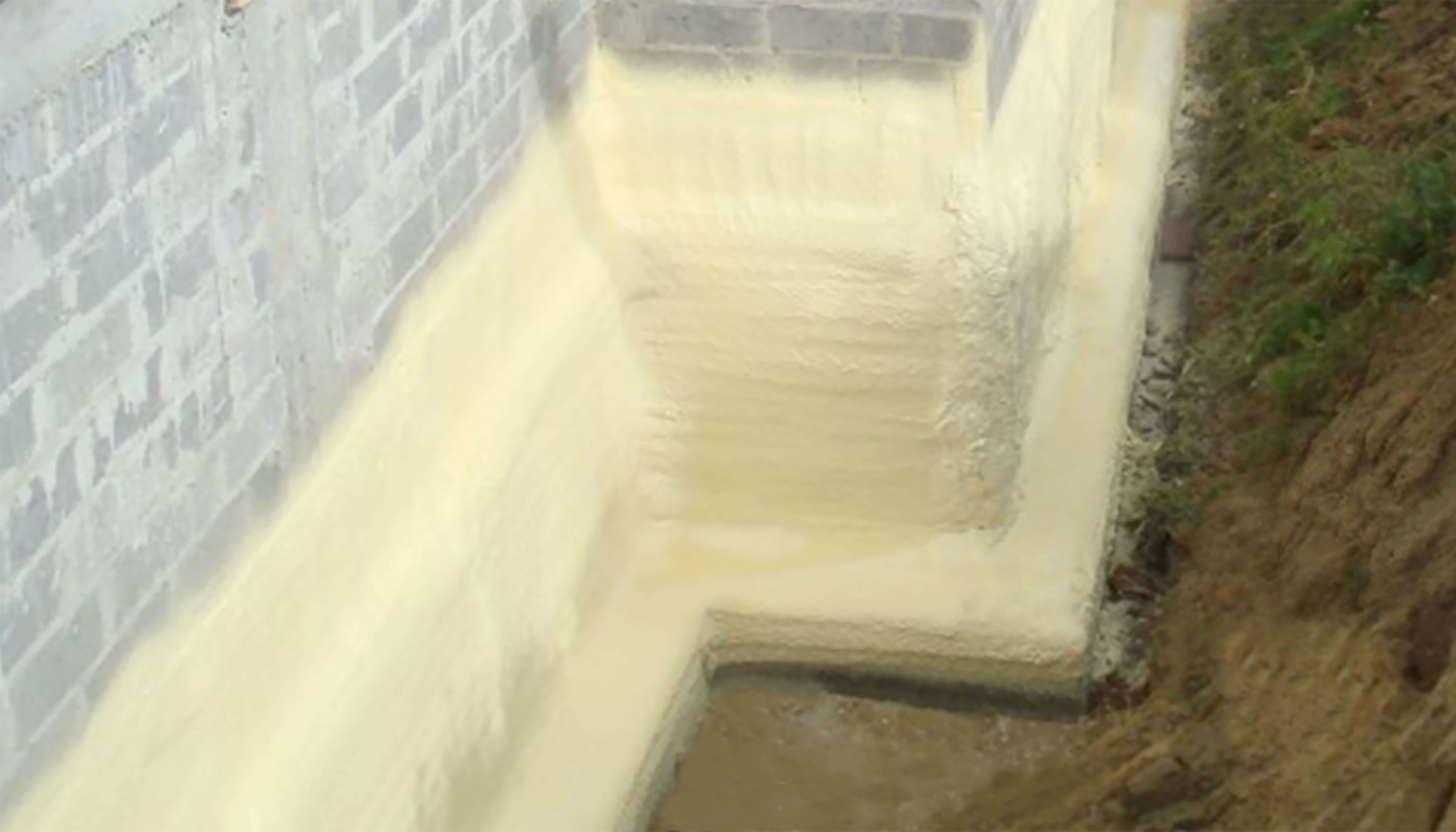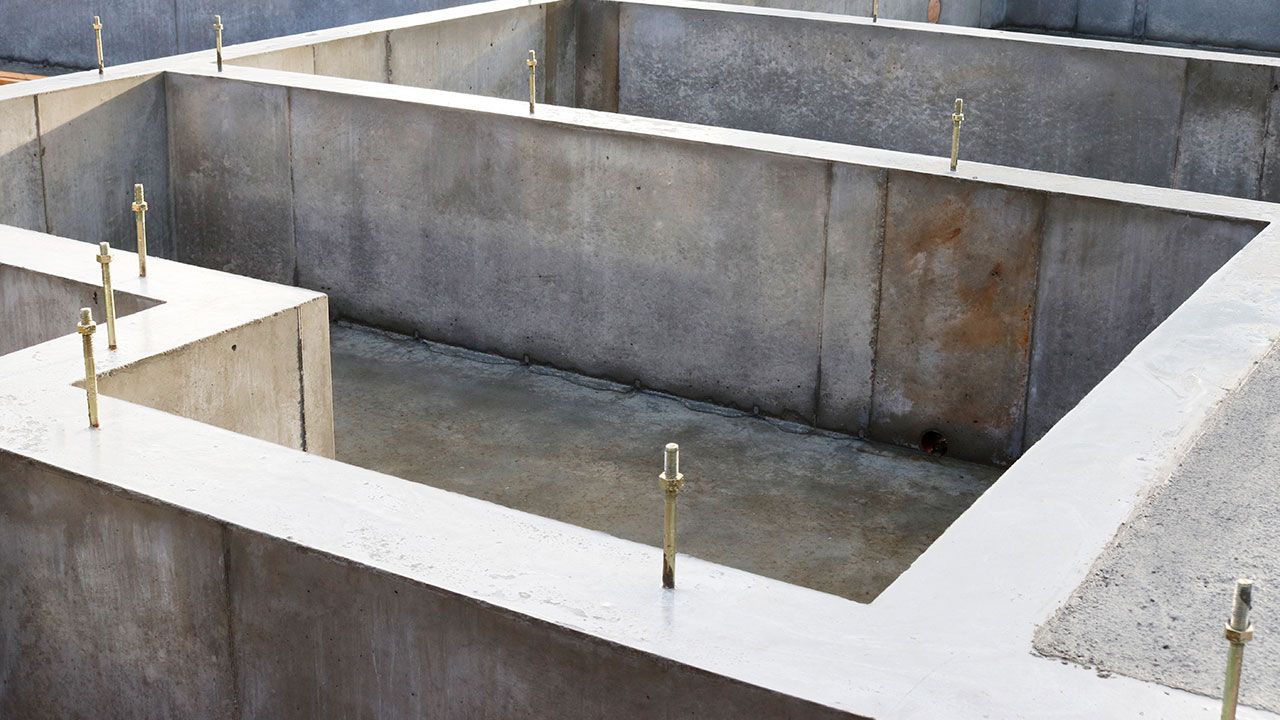Perimeter insulation of foundations — what is it?
It is obvious that ground is home to moisture. Imagine that foundations are a sponge you place in the ground. What will happen to it? It is rather clear that will quickly soak water up. The same would happen to foundations without proper insulation.
Perimeter insulation involves protecting foundation walls from the side of the ground, that is where foundations touches the earth. Foundation wall insulation prevents the moisture from penetrating the walls from the environment, e.g. precipitation water. It is good to be aware that the insulation itself requires appropriate protection against any kinds of mechanical damage so that it does not lose its properties.
Waterproofing is mostly applied directly to a foundation wall and protected with thermal insulation. It requires a material with low water absorption, such as polyurethane foam.
Insulation may be installed in a reverse order. First, apply thermal insulation to the wall and then dampproofing. In such a case, be sure to cover the waterproofing layers with, for example, dimpled membrane, which protects them against damage when backfilling the trenches.
We can distinguish several types of perimeter insulation of foundations:
Light insulation — for pervious soils
It is made on pervious soils, such as gravel and rock debris. Such insulation is made of waterproofing bituminous masses (e.g. bitumen-rubber or bitumen-polymer masses). They are elastic and easy to apply, which makes them perfect for filling any irregularities and cavities of the base surface. A polymer-based mass may also be used in low temperatures. The masses are to be applied in two layers — the first horizontally and, after it dries, the second mass is applied vertically. As a result, the entire surface will be perfectly covered.
Medium insulation — for impervious soils
If a building is situated above the ground water level on impervious soils (clay) and there is a likelihood that the ground water level may be higher than the lowest foundations of a given building, then medium insulation is required. It is made of bituminous masses (just as for light insulation, but a different product, or the same product, but a thicker layer), heat-weldable bitumen membrane or two layers of bitumen membrane with pitch. It is important to use bitumen membrane and pitch of the same type — tar- or asphalt-based.
You can also use different kinds of polyethylene or PVC membranes with thickness of more than 0.3 mm, but self-adhesive films are also available. The external layer is made of dimpled membrane. Such insulation must be made 0,5 m above the highest expected ground water level.
Heavy insulation — the most challenging ground and water conditions
Such foundation insulation protects your house in extreme cases — against water forcing its way against the building. To be more precise — it is necessary if a building is situated on cohesive soils, such as clay, loam, or silt, which, due to their properties, retain water on a long-term basis.
Heavy insulation is also recommended when ground water reaches a level above the insulation level or may exceed this level periodically. In such a case, the walls are exposed to water under hydrostatic pressure on a permanent basis.
Designing such insulation is quite a challenge. It mostly requires using several waterproofing products, including special profiles (e.g. EPDM expansion joints) and perimeter drain. For your own comfort, all the elements should be covered by a warranty of the same producer. In the most extreme conditions, the only solution is to combine heavy insulation with reinforced concrete slab made of waterproof concrete.
Perimeter insulation with polyurethane foam
 Perimeter insulation can be made using various materials, however it seems that the best material in the market is closed-cell polyurethane foam. PUR foam provides excellent thermal insulation properties, low water absorption, and high resistance to any mechanical damage (compressive strength [kPa] ≥250).
Perimeter insulation can be made using various materials, however it seems that the best material in the market is closed-cell polyurethane foam. PUR foam provides excellent thermal insulation properties, low water absorption, and high resistance to any mechanical damage (compressive strength [kPa] ≥250).
Such insulation is applied by spraying. As a result, polyurethane foam creates a uniform coating which is ideal for protecting the walls against cold transferred from the foundations.
The greatest advantage of this insulating solutions is perfect tightness and durability. What is more, thanks to the low water absorption of PUR foam, water does not penetrate between its cells and, as a result, does not reduce its thermal insulation properties. In normal water conditions, foam is a sufficient protection of waterproofing and an additional means of protecting and insulating such a system. It is an advanced solution that will last many years!

 This website uses cookies. By using this website, you consent to the use of cookies in accordance with your browser settings.
This website uses cookies. By using this website, you consent to the use of cookies in accordance with your browser settings.